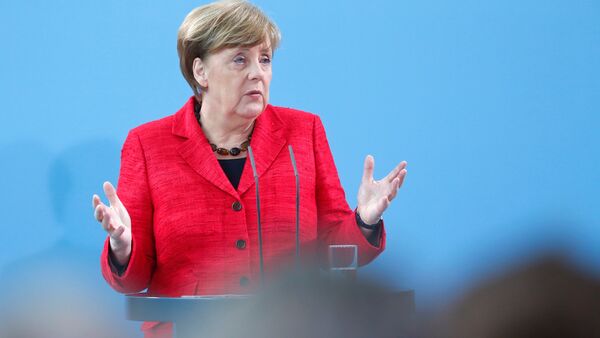Former German Chancellor Gerhard Schroeder has reflected on the dramatic loss of power by his successor Angela Merkel in the wake of her announcement that she'd decided not to seek re-election as the leader of the Christian Democrats (CDU) this December. According to him, this decision would mark the beginning of the end of Merkel's chancellorship, whenever it happened.
Schroeder, who was the head of the Social Democrats (SPD) for many years, told the German outlet Rheinische Post that the Chancellor is past her prime. Although the 72-year-old political heavyweight gave her credit for many things, he wouldn’t “further entrust reforming Europe to her.”
As the German outlet Die Welt reports, the former SPD politician said that he expected Friedrich Merz to succeed Merkel as the CDU leader, in a move he previously slammed as “a return to the old CDU with backward answers to the current challenges.” Merz, he argued, would hardly have "the special commitment" which would allow Chancellor Merkel to maintain her policies.
"And I cannot imagine that — well — my party can endure everything," Schroeder predicted, hinting at a break-up of the current government coalition between the CDU/CSU and SDU at the national level.
Schroeder described Merkel’s move as a mistake, saying the danger of snap elections is looming now. He expects that the vote would take place by the middle of next year, "at least, in early summer" 2019.
READ MORE: Merkel Will Step Down as Chancellor by May 2019 — German Ex-Foreign Minister
Angela Merkel announced on October 29 that she would stand down in December as chair of the CDU party and will not run again as chancellor in Germany's federal elections, due in 2021. Two separate polls have suggested that Friedrich Merz, a longtime opponent of Angela Merkel within the Christian Democratic Union (CDU), is a frontrunner for succeeding Germany's head of state after her departure as chancellor.
Merz became the party’s parliamentary leader in 2000. However, after the CDU lost to Gerhard Schröder’s Social Democrats in 2002, he was dislodged by Merkel. In 2009 he left the Bundestag, and was thought to have given up public service for corporate law.
Merz used to have the reputation of a divisive figure within the CDU; he once said: “This woman (Merkel) should never have been allowed to become chancellor.” He is also well-known among the German public for his position on immigration — one of the key political challenges for the country.
Even before the migrant crisis, Merz insisted that anyone wanting to live in Germany should “conform to Germany’s prevailing liberal culture,” sparking a furious national debate.


